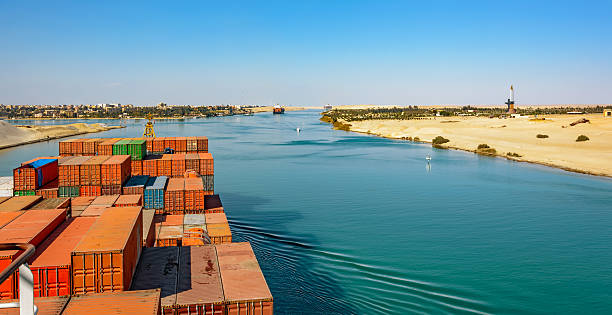Recent attacks on commercial vessels in the Red Sea have severely affected shipping through the Suez Canal, adding to existing geopolitical and climate-related challenges facing global trade and supply chains, UNCTAD says in a new report released today.
The Red Sea crisis compounds the ongoing disruptions in the Black Sea due to the war in Ukraine, which have resulted in shifts in oil and grain trade routes and altered established patterns.
Additionally, the Panama Canal, a critical artery linking the Atlantic and Pacific oceans, is confronting a separate challenge. Dwindling water levels have raised concerns about the long-term resilience of global supply chains, underscoring the fragility of the world’s trade infrastructure.
UNCTAD estimates that transits passing the Suez Canal decreased by 42% compared to its peak. With major players in the shipping industry temporarily suspending Suez transits, weekly container ship transits have fallen by 67%, and container carrying capacity, tanker transits, and gas carriers have experienced significant declines.
Meanwhile, total transits through the Panama Canal plummeted by 49% compared to its peak.
Mounting uncertainty and shunning the Suez Canal to reroute around the Cape of Good Hope has both economic and environmental repercussions, particularly for developing economies.
Growing significantly since November 2023, the surge in the average container spot freight rates registered the highest-ever weekly increase of $500 in the last week of December. This trend has continued.
Average container shipping spot rates from Shanghai more than doubled since early December (+122%), growing more than threefold to Europe (+256%), and even above average (+162%) to the United States West Coast, despite not going through Suez.
Ships are avoiding the Suez and Panama canals and seeking alternative routes. This combination translates into longer cargo travel distances, rising trade costs and insurance premiums.
Furthermore, greenhouse gas emissions are also growing from having to travel longer distances and at greater speed to compensate for the detours.
The Panama Canal is particularly important for the foreign trade of countries on the West Coast of South America. Approximately 26% of Ecuador’s trade volumes cross the canal. The share is around 22% for both Chile and Peru.
Foreign trade for several East African countries is highly dependent on the Suez Canal. Approximately 31% and 34% of foreign trade by volume for Djibouti and the Sudan, respectively, is channeled through the waterway connecting the Mediterranean Sea to the Red Sea.
With ships now avoiding the Suez and Panama Canals, this translates into longer cargo travel distances, rising trade costs, and increased insurance premiums. At the same time, greenhouse gas emissions are also growing due to the greater distances and speeds necessary to compensate for these detours.
UNCTAD warns that prolonged interruptions in container shipping threaten global supply chains and could delay deliveries, leading to higher costs and inflation. In addition, energy prices are surging as gas transits are discontinued, directly impacting energy supplies and prices, and potentially global food prices.
(Suez Canal photo)





